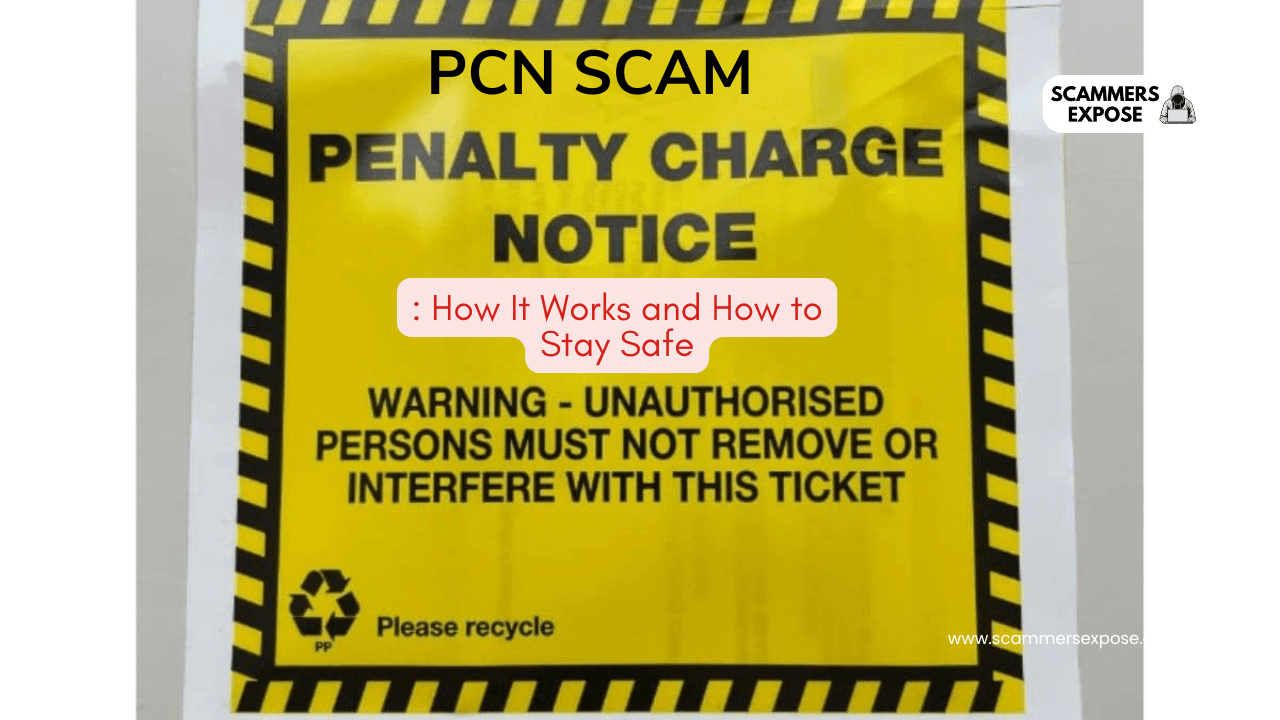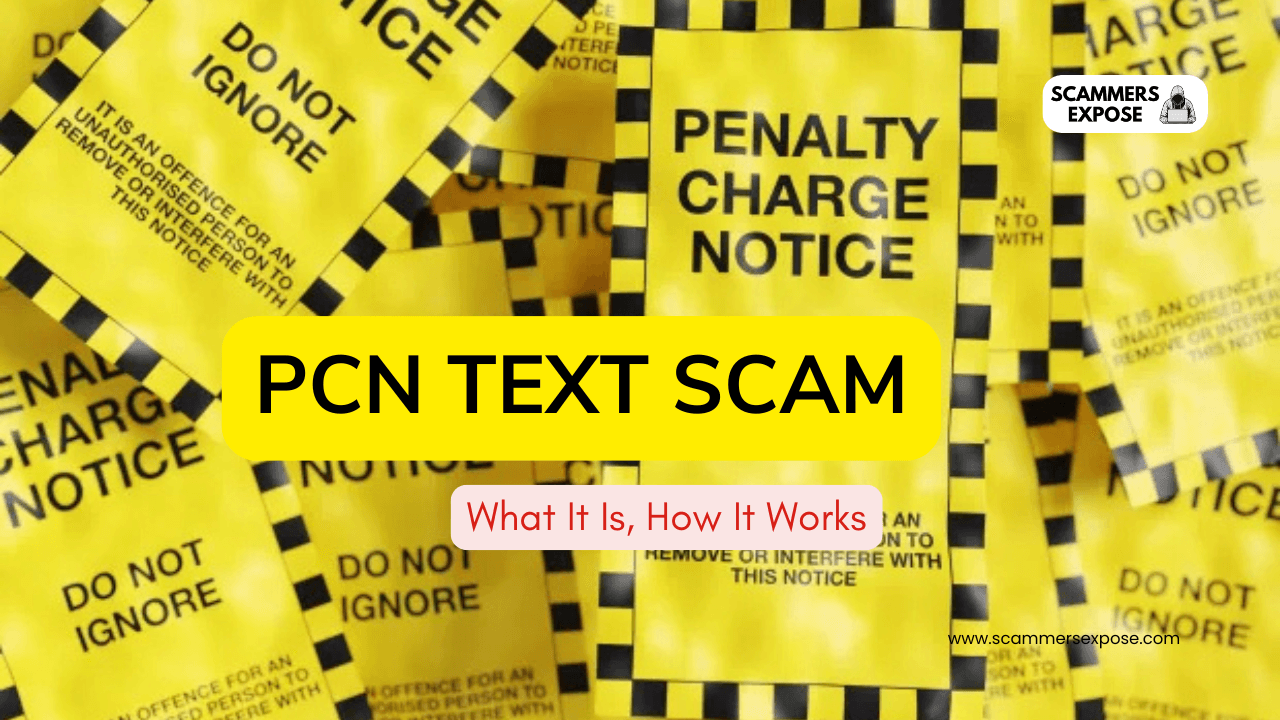The PCN text scam is a deceptive scheme where fraudsters impersonate official government or parking authorities to trick victims into paying fake Penalty Charge Notices (PCNs). These messages typically arrive via SMS and claim that the recipient owes a fine for a parking violation.
The goal? To steal your personal and financial information, or to trick you into sending money directly to the scammers.
This scam is rapidly growing in popularity across the UK and other countries with formal parking fine systems, preying on confusion and fear.
How the PCN Text Scam Works: Step-by-Step Breakdown
Scammers operate in calculated steps to make the pcn text scam as convincing as possible:
Step 1: Initial Text Message
- You receive an SMS claiming to be from your local council or a parking authority.
- The message says you have an unpaid PCN and must act quickly to avoid additional penalties.
- Example: “Final Notice: Your PCN #837291 is overdue. Pay £80 now to avoid legal action. https://fakegovfine.co.uk“
Step 2: Link to Fake Website
- The link in the text directs you to a phishing website that looks identical to an official parking payment portal.
- The website may use government logos, real-sounding domain names, and professional layouts to gain trust.
Step 3: Request for Personal and Payment Information
- You’re prompted to enter personal details like:
- Your name
- Address
- Vehicle registration
- Debit or credit card information
- Once entered, this data goes straight into the hands of the scammers.
Step 4: Money Theft or Identity Fraud
- Your payment card is charged for the “fine” (which goes to the fraudsters).
- Or worse: your personal data is used for identity theft or sold on the dark web.
Red Flags and Warning Signs
Be alert to these common signs of the pcn text scam:
- Unfamiliar or suspicious links in a text message (especially shortened URLs)
- Urgent language pressuring you to pay immediately
- Claims you have a PCN but provide no specific details about the location, time, or issuing authority
- A text from a mobile number, rather than an official short code or known sender
- Poor grammar or odd phrasing in the message
- Requests for unusual payment methods, such as cryptocurrency, gift cards, or wire transfers
Realistic Victim Examples (Anonymized)
Case 1: Rachel, 32, from Manchester
Rachel received a text claiming she had a parking fine due within 24 hours. She clicked the link and paid £60 using her debit card. Two days later, she noticed several unauthorized transactions on her account totaling over £500. Her bank flagged it as fraud, but the stress and inconvenience took weeks to resolve. PCN text scam
Case 2: Tom, 48, from Birmingham
Tom got a text with a realistic-looking council logo and paid a “fine” of £75. He later realized the website URL ended in “.info” instead of “.gov.uk.” Fortunately, his bank reimbursed him after reporting the scam.
How to Protect Yourself from the PCN Text Scam
Here are proven steps you can take to avoid falling victim to the pcn text scam:
1. Never Click Suspicious Links
- Visit the official website of your local council by typing the address directly into your browser.
- Don’t trust links sent by text unless you’ve previously opted into SMS alerts.
2. Verify the PCN
- Most councils allow you to check PCNs online using your car’s registration number and a PCN reference.
- If the text doesn’t include specific information, it’s likely fake.
3. Check the Website URL
- Real council or government websites will have domains ending in .gov.uk or other official endings.
- Avoid sites that use odd domain names or slight misspellings of real ones.
4. Use Two-Factor Authentication (2FA)
- Protect your accounts, especially email and banking, with 2FA to make it harder for scammers to misuse stolen credentials.
5. Keep Your Device Updated
- Ensure your smartphone and apps are up to date to protect against vulnerabilities exploited by scammers.
6. Be Skeptical of Urgency
- Scammers rely on pressure. Take a step back, breathe, and verify before taking action.
How and Where to Report the Scam
If you receive or fall victim to a pcn text scam, report it immediately to help stop the fraud and protect others.
In the UK:
- Report to Action Fraud: https://www.actionfraud.police.uk/
- Forward scam texts to 7726 (free spam-reporting number)
- Contact your bank immediately to freeze your card and report unauthorized charges
- Notify your local council, especially if the scam impersonated them
In the US:
- Report to the FTC: https://reportfraud.ftc.gov/
- File a complaint with the Internet Crime Complaint Center (IC3): https://www.ic3.gov/
Final Thoughts: Stay Vigilant and Spread the Word
The pcn text scam is a dangerous trick that uses urgency and impersonation to prey on innocent people. But with awareness and caution, you can outsmart the fraudsters.
If you’ve found this guide helpful:
- Share this article with friends and family
- Bookmark Scammers Expose for the latest scam alerts
- Stay informed and remember: legitimate authorities will never threaten or rush you into paying via SMS
Together, we can stop scams before they happen. Stay safe out there!
Visit our news section to stay updated with the latest developments in the case. For more insights into financial fraud and investor protection, visit Scammers Expose.










Leave a Reply